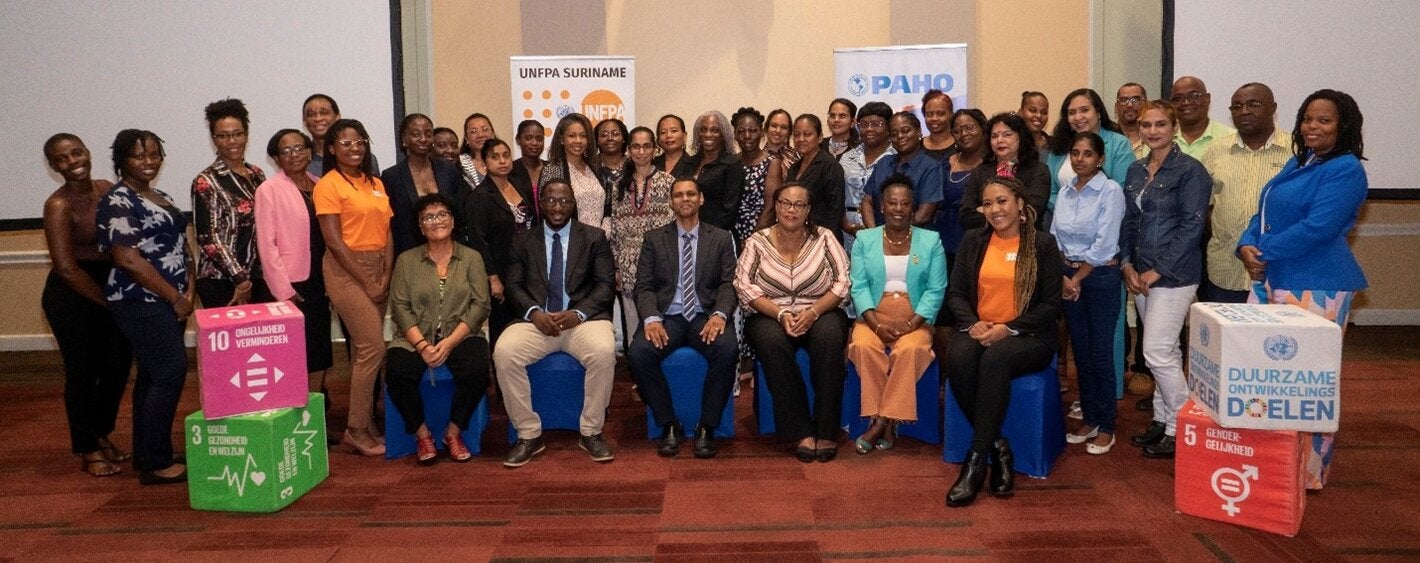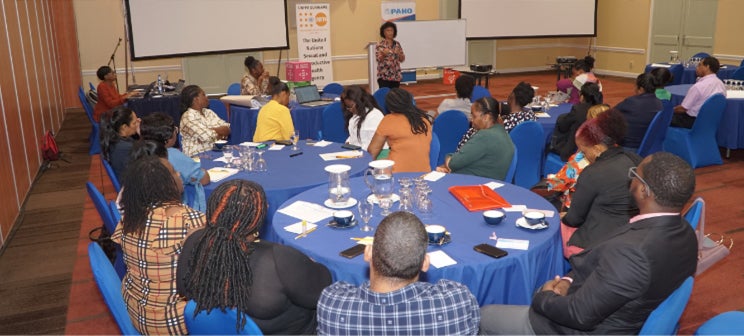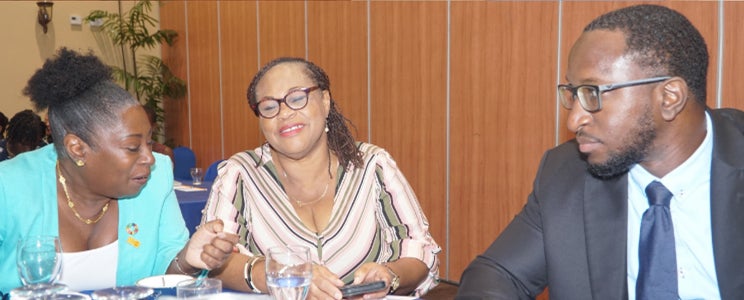
Suriname, November 30, 2023 (PAHO) – In order to promote reproductive health and empowering women in Suriname, the Ministry of Public Health (MoPH) partnered with the United Nations Population Fund (UNFPA) and the Pan American Health Organization/World Health Organization (PAHO/WHO) to conduct a pivotal two-day workshop on November 28 and 29, 2023. The workshop focused on the introduction of Long-Acting Reversible Contraceptives (LARCs) in Suriname, addressing the pressing need for accessible and effective modern family planning methods for women and girls in Suriname.
The workshop commenced with opening remarks from keypersons, namely Dr. Jack Noreen (PAHO/WHO), Judith Brielle (UNFPA), and Dr. Rakesh Sukul, Director of Health at the Ministry of Health. The backdrop emphasized that while family planning is a human right and a key element in reducing poverty, there is still a considerable unmet need in Suriname. Shockingly, latest MICS data (2018) show that nationwide use of contraception dropped to 39%, with the highest drop among adolescent, with a contraceptive prevalence rate of only 23%. Adolescent fertility rates are also strongly influenced by living area, educational and income level. Rates are higher in the interior districts and among those girls with low education and in the lowest wealth categories.
The workshop continued with informative sessions of Kenneth Slijngaard and Nensy Bandhoe of the Foundation Lobi Health Center on the available package of contraceptives. Judith Brielle of UNFPA continued with a global overview of the legal and regulatory aspects based on the Sexual Reproductive Health and Rights legislative review conducted for Suriname as part of a regional initiative. The review resulted in five regional policy briefs which can be used for ongoing advocacy and policy dialogue for acceleration of actions to improve SRH. Julia Terborg, of the PAHO country office, presented on the prevalence of unintended pregnancies in the region, the impact of gender, education and poverty and the high need for raising awareness on the cost effectiveness of investing in universal access to modern contraceptives and prenatal health care. Keypersons from the Medical Mission, Maureen Wijngaarde and Melvin Uiterloo shared experiences on the dynamics of ethnic-specific cultural traditions, obstacles and good practices regarding use and access to contraceptives among communities in the hinterland. Cher Lamsberg, head of the Basic Life Skills department of the Ministry of Education, presented on the progress that this department has achieved with interventions aimed at phased integration of Comprehensive Sexuality Education (CSE) in schools. A roundtable discussion was also featured on family planning practices, exploring achievements and challenges in addressing the diverse needs of Surinamese communities, from the perspectives of different services providers present.
International perspectives were brought to the forefront in the form of presentations from Caribbean countries. Nickeshia Barnes from the National Family Planning Board Jamaica, Ministry of Health, shared insights on a successful pilot project involving implants among adolescents, while Kudzai Sengwe from the Ministry of Health Guyana discussed the successes, challenges, and the way forward for implant use in their context. These presentations laid the groundwork for a panel discussion, fostering knowledge exchange and collaborative problem-solving.
The second day of the workshop focused on practical engagement, with working groups deliberating on the development of a realistic roadmap for the introduction of LARCs in Suriname. The groups were tasked with addressing challenges and formulating actionable strategies.
This joint initiative between the Ministry of Public Health, UNFPA, and PAHO/WHO marks a crucial step in introducing Long-Acting Reversible Contraceptives (LARCS) in Suriname. LARCS are not only highly effective and cost-effective but also empower women to make informed decisions about their fertility. Addressing challenges in sexual and reproductive health, especially among vulnerable groups, requires intensified efforts to disseminate information, raise awareness, and eliminate barriers to LARC methods. We are committed to working closely with the Ministry of Public Health and UNFPA to reduce the unmet need for family planning, ensure equitable access to contraceptives, and expand choices for adolescents.
PWR Dr Noreen Jack
The event concluded with presentations from the working groups, providing a comprehensive overview of the discussions. The presentations from the working groups highlighted the need to increase preventive measures, including improving access to condoms and oral contraceptives; the delivery of information to allow informed decision making by young people through in and out of school basic life skills and comprehensive sexuality education; inclusion of men and boys in the discussion and programming on SRH; and to raise awareness at all levels and functions in our community for behavior change when it relates to family planning and the use of modern contraceptives. Judith Brielle and Julia Terborg, from respective UNFPA and PAHO, outlined the commitments and next steps, underscoring the importance of collective efforts to enhance reproductive health in the country.
The "Introducing LARCS in Suriname" workshop marked a crucial step towards addressing the unmet need for family planning in the country. By bringing together key stakeholders, sharing international experiences, and fostering practical engagement, the event laid the foundation for a realistic roadmap. As Suriname strives to ensure that all women can decide whether, when, and how often to become pregnant, the commitments made and the strategies developed during this workshop are poised to play a pivotal role in transforming reproductive health outcomes in the nation.





